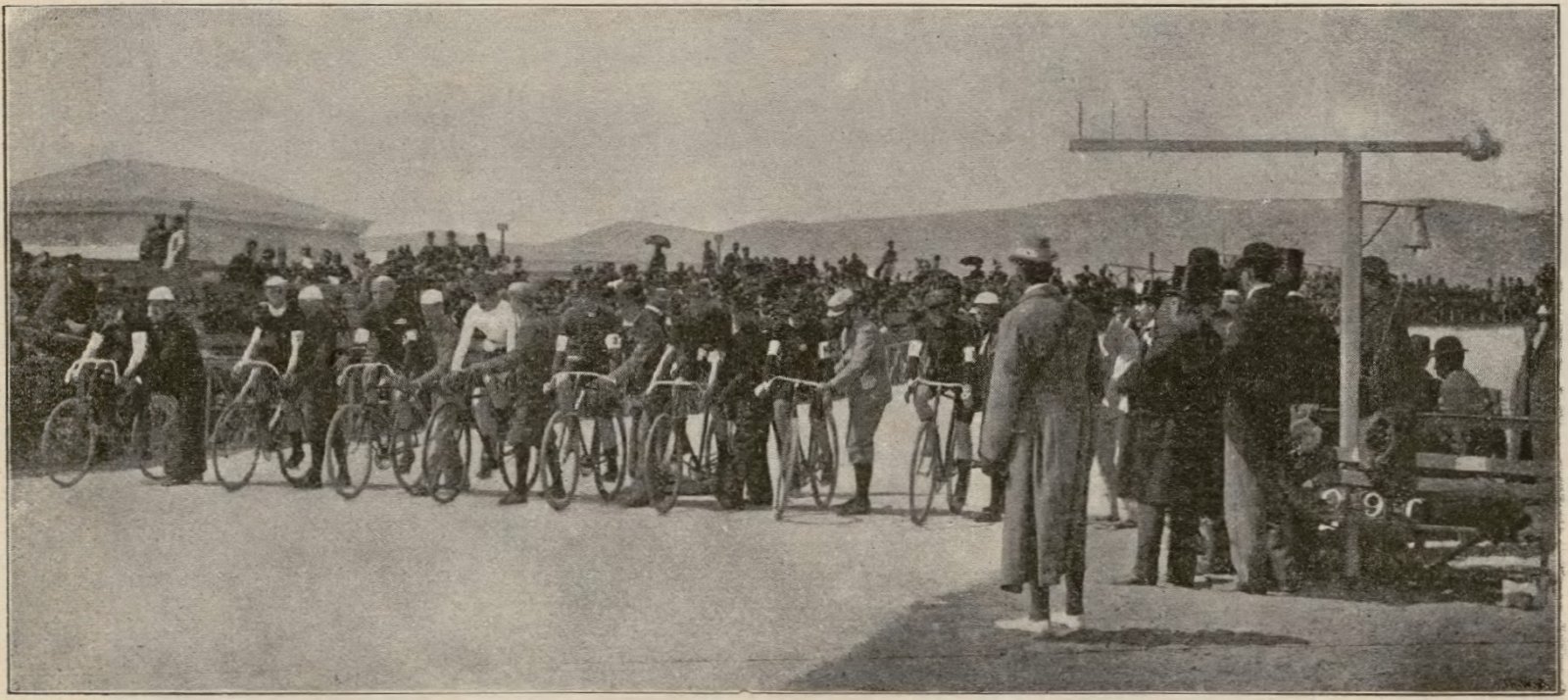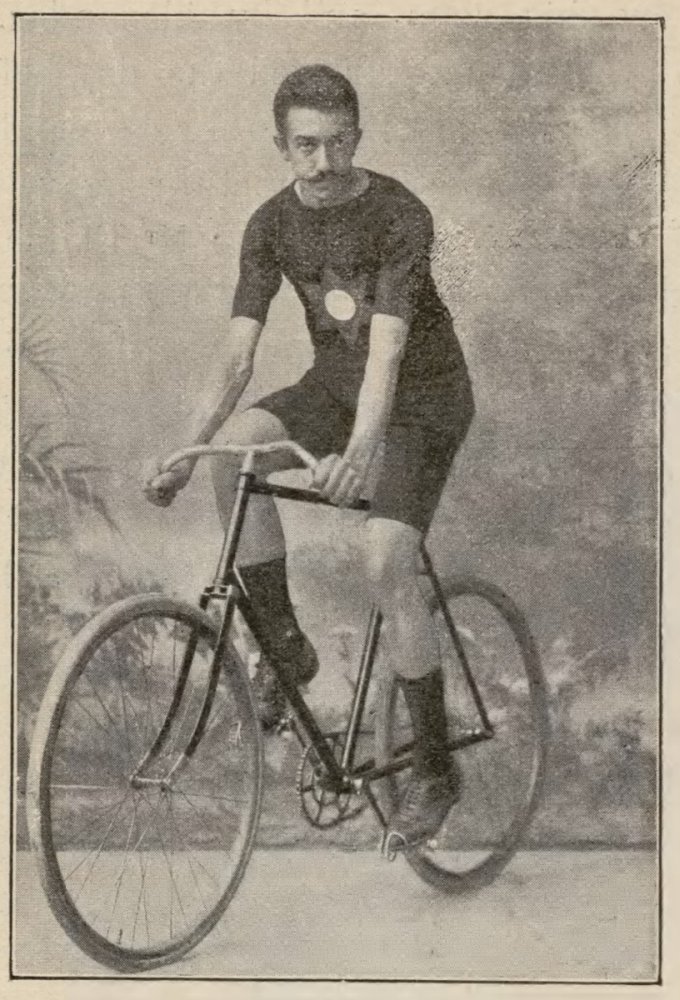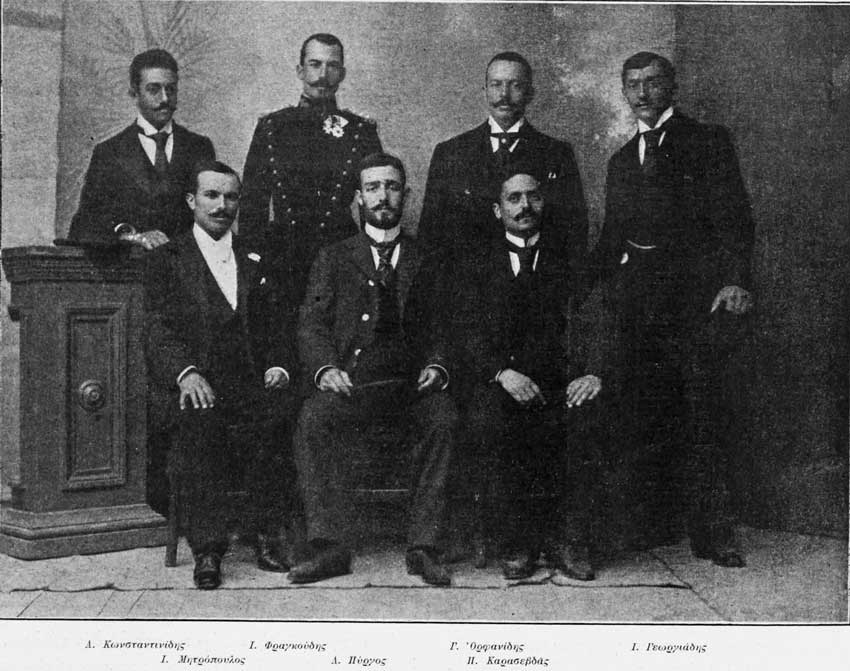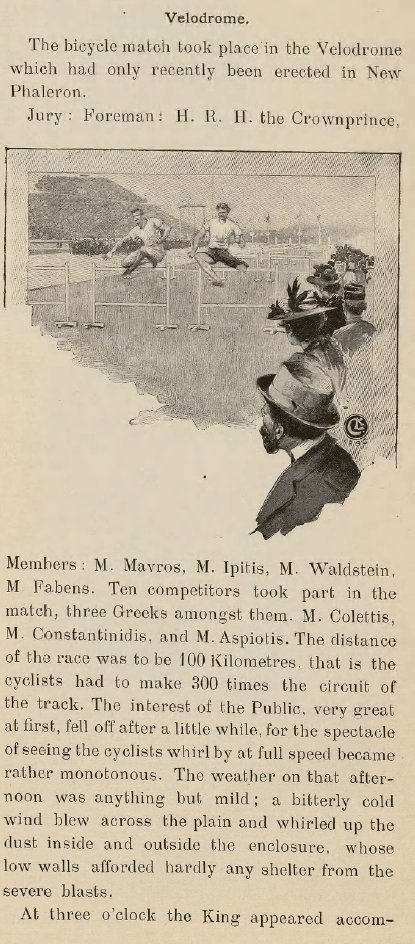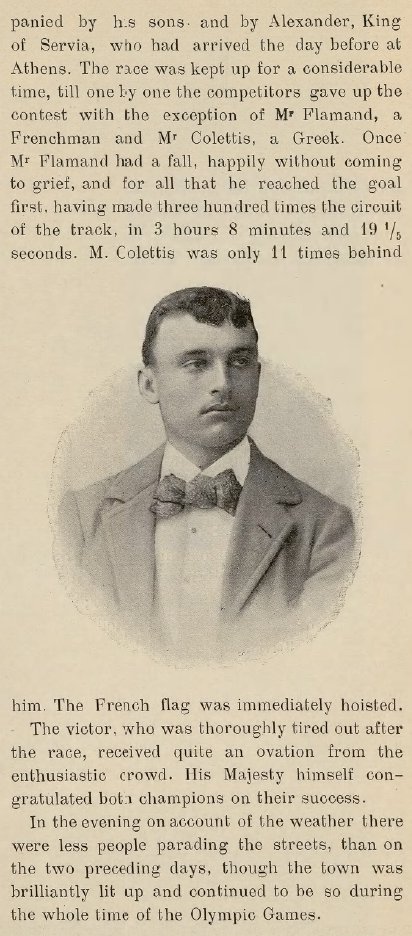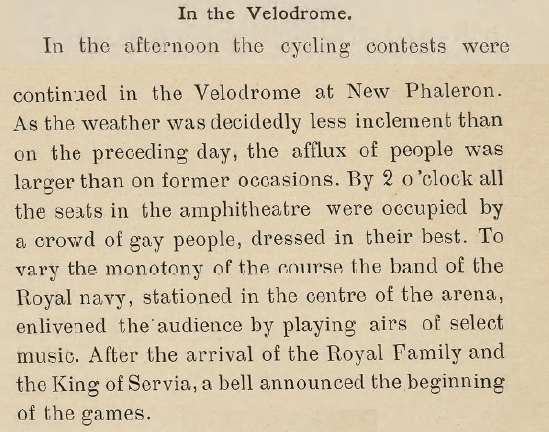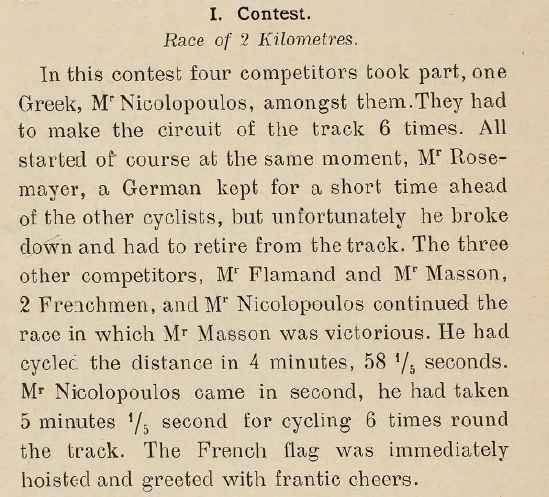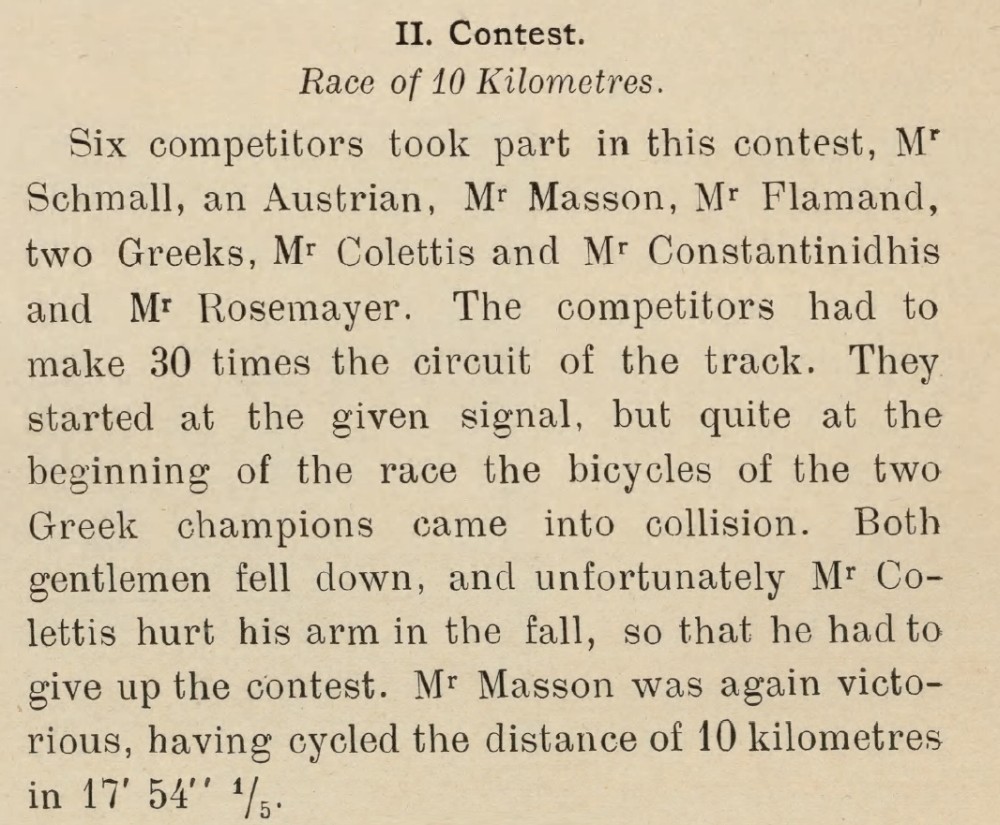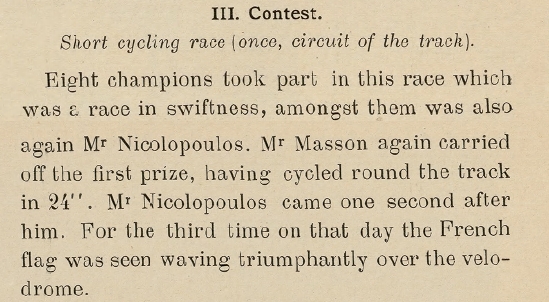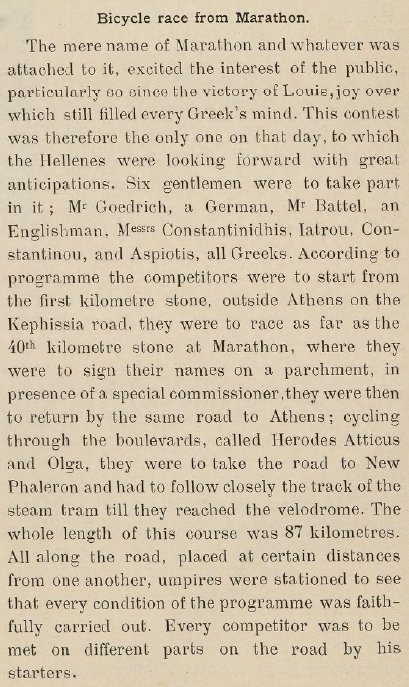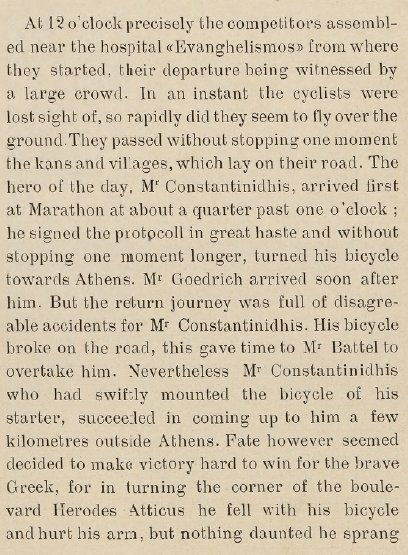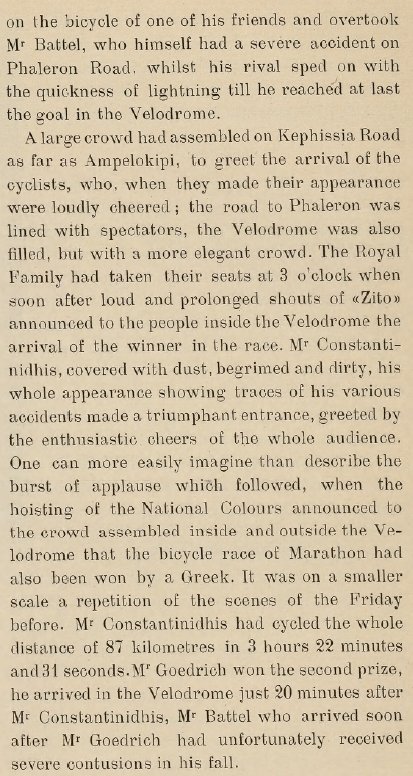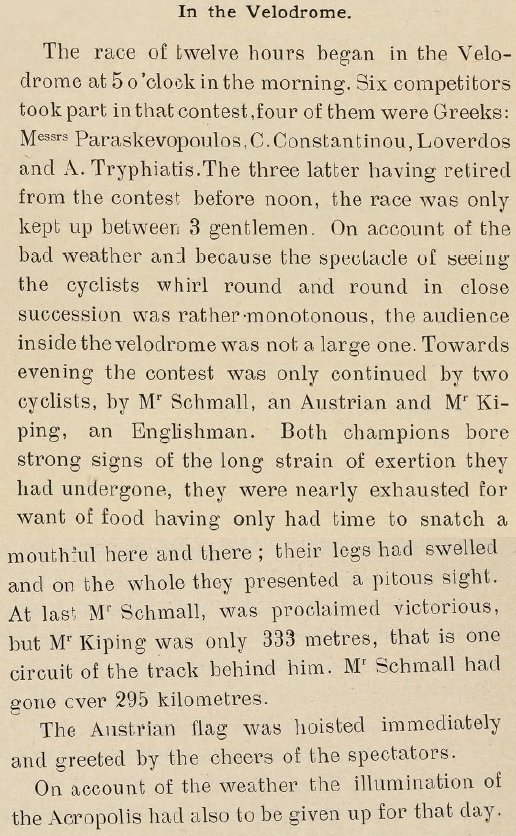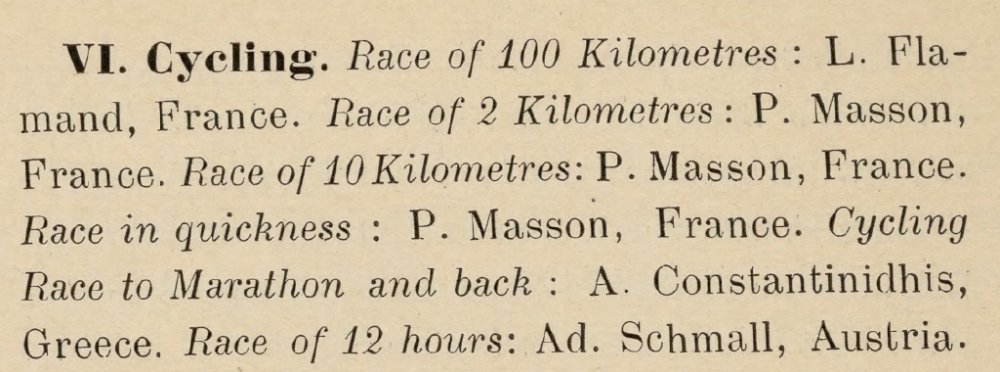Main picture: Start of the Cyclists
Aristidis Konstantinidis, winner in the cycling race to Marathon and back
Aristidis Konstantinidis was a Greek Cypriot cyclist descending from Lefkonoiko in the Famagusta region, Cyprus. He competed in the very first modern Olympic Games in Athens (1896) and won the Gold Medal in the road race, in what seems to have been a very eventful race, full of crashes and bike failures!
At the time, the records show that he was living in Athens - at least since 1891 when according to historic references he co-founded the “Athens Cycling Association” (Podilatikos Sillogos Athinon). Due to that and since Cyprus was under British rule, he participated in the Olympics with the Greek team.
The Road Race - or the “Bicycle Race from Marathon” as it is mentioned in the first volume of the “The Olympic Games” report (1897) - was held on the 7th day of the Games, on March 31st (old calendar - April 12th with the new calendar). The race started at 12 o’clock outside the Evangelismos hospital, right on the stone marking the first kilometer of the Kifissia road. The six riders who took the start raced to the stone marking the 40th kilometer in Marathon city. There, they had to sign their name in the presence of a special commissioner before returning from the same road. Once in the city of Athens, the course followed the Herodes Atticus boulevard, which led to the Panathenaic Stadium. From there they took the Vasilissis Olgas (Queen Olgas) boulevard to the temple of Olympian Zeus before following the tracks of the steam train to reach the velodrome in Neo Phaliro where the finish took place. The beautiful Neo Phaliro velodrome had been built in 1895, just before the Games, but unfortunately, in 1964 it was converted into the “Karaiskakis” football stadium.
Greek Olympic medal winners
Konstantinides arrived first in Marathon city after 1 hour and 15 minutes, and was followed closely after by the German rider, Mr. Goedrich. On his return, Konstantinidis bicycle broke down which allowed the British rider, Mr. Battel, to catch and overtake him. The starters of the riders were to meet them in different parts of the course. When he found his starter, Konstantinides swaped bikes and managed to catch the British rider a few kilometers outside Athens.
Entering the city the riders were welcomed by a big crowd which, following the win in the Marathon race by Spyros Louis two days earlier, filled the streets all the way to the velodrome and enthusiastically cheered the rider of the Greek team. As he was turning in the Herodes Atticus boulevard, disaster struck again! He fell off his bike, hurt his arm and broke his second bike! He quickly jumped on the bike of a friend and no sooner than later caught Mr. Battel who himself had a crash on Phaliro Road.
Konstantinides led the race all the way to the velodrome, which was packed with spectators including the Greek Royal family. As the report mentions he made a triumphant entrance in the stadium, covered in dust and his whole appearance testified to the hardships he endured on the road! In the stadium, he was greeted with loud and prolonged shouts of «Zito».
He completed the distance of 87 kilometers winning the race in 3 hours 22 minutes and 31 seconds. The German rider, Mr Goedrich, arrived in second place 20 minutes later with Mr. Battel following soon, losing third place after suffering from head injuries as a result of several falls. The other three participants of the Road Race were the Greeks Iatrou, Constantinou and Aspiotis for whom, besides taking the start, no other mention is made in the report.
Besides the road race, Konstantinidis also competed in the 10 km and 100 km races in the velodrome, races that he didn’t finish. He did not participate in the 12-hour race or the other shorter events (2km and 1 lap of the velodrome).
10 years later, he competed again in the interlude Games of 1906 in Athens, but failed to finish.
Main Source:
"The Olympic Games in ancien times", volume 2 | Olympic World Library
The original text from the report, regarding the Cycling events from the 1896 Olympic Games
3rd day - April 8th (March 27)
Velodrome.
The bicycle match took place in the Velodrome which had only recently been erected in New Phaleron.
Jury: Foreman; H. R. H. the Crownprince, Members : M. Mavros, M. Ipitis, M. Waldstein, M Fabens. Ten competitors took part in the match, three Greeks amongst them. M. Colettis, M. Constantinidis, and M. Aspiotis. The distance of the race was to be 100 Kilometres, that is the cyclists had to make 300 times the circuit of the track. The interest of the Public, very great at first, fell off after a little while, for the spectacle of seeing the cyclists whirl by at full speed became rather monotonous. The weather on that afternoon was anything but mild; a bitterly cold wind blew across the plain and whirled up the dust inside and outside the enclosure, whose low walls afforded hardly any shelter from the severe blasts.
At three o clock the King appeared accom-panied by his sons and by Alexander, King of Servia, who had arrived the day before at Athens. The race was kept up for a considerable time, till one by one the competitors gave up the contest with the exception of Mr Flamand, a Frenchman and Mr Colettis, a Greek. Once Mr Flamand had a fall, happily without coming to grief, and for all that he reached the goal first, having made three hundred times the circuit
of the track, in 3 hours 8 minutes and 19 1/5 seconds. M. Colettis was only 11 times behind him. The French flag was immediately hoisted.
The victor, who was thoroughly tired out after the race, received quite an ovation from the enthusiastic crowd. His Majesty himself congratulated both champions on their success.
In the evening on account of the weather there were less people parading the streets, than on the two preceding days, though the town was brilliantly lit up and continued to be so during the whole time of the Olympic Games.
6th day - April 11th (March 30th)
In the Velodrome.
In the afternoon the cycling contests were continued in the Velodrome at New Phaleron. As the weather was decidedly less inclement than on the preceding day, the afflux of people was larger than on former occasions. By 2 o'clock all the seats in the amphitheatre were occupied by a crowd of gay people, dressed in their best. To vary the monotony of the course the band of the Royal navy, stationed in the centre of the arena, enlivened the'audience by playing airs of select music. After the arrival of the Royal Family and the King of Servia, a bell announced the beginning of the games.
I. Contest
Race of 2 Kilometres.
In this contest four competitors took part, one Greek, MrNicolopoulos, amongst them.They had to make the circuit of the track 6 times. All started of course at the same moment, Mr Rose-mayer, a German kept for a short time ahead of the other cyclists, but unfortunately he broke down and had to retire from the track. The three other competitors, Mr Flamand and Mr Masson, 2 Frenchmen, and Mr Nicolopoulos continued the race in which Mr Masson was victorious. He had cycled the distance in 4 minutes, 58 1/5 seconds. Mr Nicolopoulos came in second, he had taken 5 minutes 1/5 second for cycling 6 times round the track. The French flag was immediately hoisted and greeted with frantic cheers.
II. Contest
Race of 10 Kilometres.
Six competitors took part in this contest, Mr Schmall, an Austrian, Mr Masson, Mr Flamand, two Greeks, Mr Colettis and Mr Constantinidhis and Mr Rosemayer. The competitors had to make 30 times the circuit of the track. They started at the given signal, but quite at the beginning of the race the bicycles of the two Greek champions came into collision. Both gentlemen fell down, and unfortunately Mr Colettis hurt his arm in the fall, so that he had to give up the contest. Mr Masson was again victorious, having cycled the distance of 10 kilometres in 17’ 54” 1/5.
III. Contest.
Short cycling race (once, circuit of the track).
Eight champions took part in this race which was a race in swiftness, amongst them was also again Mr Nicolopoulos. Mr Masson again carried off the first prize, having cycled round the track in 24”. Mr Nicolopoulos came one second after him. For the third time on that day the French flag was seen waving triumphantly over the velodrome.
7th day - April 12th (March 31st)
Bicycle race from Marathon.
The mere name of Marathon and whatever was attached to it, excited the interest of the public, particularly so since the victory of Louis, joy over which still filled every Greek's mind. This contest was therefore the only one on that day, to which the Hellenes were looking forward with great anticipations. Six gentlemen were to take part in it ; Mr Goedrich, a German, Mr Battel, an Englishman, Messrs Constantinidhis, latrou, Constantinou, and Aspiotis, all Greeks. According to programme the competitors were to start from the first kilometre stone, outside Athens on the Kephissia road, they were to race as far as the 40th kilometre stone at Marathon, where they were to sign their names on a parchment, in presence of a special commissioner,they were then to return by the same road to Athens ; cycling through the boulevards, called Herodes Atticus and Olga, they were to take the road to New Phaleron and had to follow closely the track of the steam tram till they reached the velodrome. The whole length of this course was 87 kilometres. All along the road, placed at certain distances from one another, umpires were stationed to see that every condition of the programme was faithfully carried out. Every competitor was to be met on different parts on the road by his starters.
At 12 o'clock precisely the competitors assembled near the hospital «Evanghelismos» from where they started, their departure being witnessed by a large crowd. In an instant the cyclists were lost sight of, so rapidly did they seem to fly over the ground.They passed without stopping one moment the kans and villages, which lay on their road. The hero of the day, Mr Constantinidhis, arrived first at Marathon at about a quarter past one o'clock ; he signed the protocoll in great haste and without stopping one moment longer, turned his bicycle towards Athens. Mr Goedrich arrived soon after him. But the return journey was full of disagreable accidents for Mr Constantinidhis. His bicycle broke on the road, this gave time to Mr Battel to overtake him. Nevertheless Mr Constantinidhis who had swiftly mounted the bicycle of his starter, succeeded in coming up to him a few kilometres outside Athens. Fate however seemed decided to make victory hard to win for the brave Greek, for in turning the corner of the boulevard Herodes Atticus he fell with his bicycle and hurt his arm, but nothing daunted he sprang on the bicycle of one of his friends and overtook Mr Battel, who himself had a severe accident on Phaleron Road, whilst his rival sped on with the quickness of lightning till he reached at last the goal in the Velodrome.
A large crowd had assembled on Kephissia Road as far as Ampelokipi, to greet the arrival of the cyclists, who, when they made their appearance were loudly cheered ; the road to Phaleron was lined with spectators, the Velodrome was also filled, but with a more elegant crowd. The Royal Family had taken their seats at 3 o'clock when soon after loud and prolonged shouts of «Zito» announced to the people inside the Velodrome the arrival of the winner in the race. Mr Constantinidhis, covered with dust, begrimed and dirty, his whole appearance showing traces of his various accidents made a triumphant entrance, greeted by the enthusiastic cheers of the whole audience. One can more easily imagine than describe the burst of applause which followed, when the hoisting of the National Colours announced to the crowd assembled inside and outside the Velodrome that the bicycle race of Marathon had also been won by a Greek. It was on a smaller scale a repetition of the scenes of the Friday before. Mr Constantinidhis had cycled the whole distance of 87 kilometres in 3 hours 22 minutes and 31 seconds.Mr Goodrich won the second prize, he arrived in the Velodrome just 20 minutes after Mr Constantinidhis, Mr Battel who arrived soon after Mr Goedrich had unfortunately received severe contusions in his fall.
8th day - April 13th (April 1st)
In the Velodrome.
The race of twelve hours began in the Velodrome at 5 o'clock in the morning. Six competitors took part in that contest, four of them were Greeks: Messrs Paraskevopoulos.C.Constantinou,Loverdos and A. Tryphiatis.The three latter having retired from the contest before noon, the race was only kept up between 3 gentlemen. On account of the bad weather and because the spectacle of seeing the cyclists whirl round and round in close succession was rather-monotonous, the audience inside the velodrome was not a large one. Towards evening the contest was only continued by two cyclists, by Mr Schmall, an Austrian and Mr Kiping, an Englishman. Both champions bore strong signs of the long strain of exertion they had undergone, they were nearly exhausted for want of food having only had time to snatch a mouthful here and there ; their legs had swelled and on the whole they presented a pitous sight. At last Mr Schmall, was proclaimed victorious, but Mr Kiping was only 333 metres, that is one circuit of the track behind him. Mr Schmall had gone over 295 kilometres.
The Austrian flag was hoisted immediately and greeted by the cheers of the spectators.
On account of the weather the illumination of the Acropolis had also to be given up for that day.
The names of the winners of the Cycling events of the 1896 Olympic Games
VI. Cycling. Race of 100 Kilometres : L. Flamand, France. Race of 2 Kilometres: P. Masson, France. Race of 10Kilometres: P. Masson, France. Race in quickness : P. Masson, France. Cycling Race to Marathon and back : A. Constantinidhis, Greece. Race of 12 hours: Ad. Schmall, Austria.


